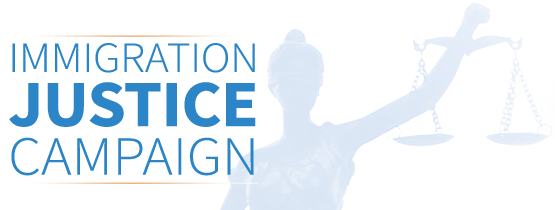Joanna Diamond
I am a lawyer by education, but a policy wonk by profession. It had been over 8 years since I practiced law as a Rule 16 student attorney in law school and 7 years since I clerked for an appellate judge on the Court of Special Appeals in Maryland. But when I had the opportunity to take a step back from my career in public policy and determine what I wanted to do next, I decided I wanted to hop back into law and practice - but on a smaller level. I took on a variety of cases through local legal services providers. It was wonderful to finally practice law. But after many years of working on immigration justice public policy issues and working with children in immigration court for nearly a year, I was ready to take on a full immigration case. What came next was one of the most challenging yet rewarding experiences of my professional life.
I started to do research online about the type of immigrant rights organization for which I wanted to volunteer. I reached out to a number of local and national organizations that I found in need of pro bono attorneys. Among the most responsive was the American Immigration Lawyers Association (AILA) and I realized that some of the most cutting edge and important work was being done by AILA and their partners through the Immigration Justice Campaign (the Justice Campaign).
When Jocelyn Dyer, AILA’s Counsel for Pro Bono Programs, contacted me about my interest in taking on a pro bono case, it was only the first of many conversations with Jocelyn and others from the Justice Campaign where I felt supported and confident in taking on a full case as a relatively newly-practicing attorney. They asked if I wanted to take the case of Pierre1*, an African man who was attacked by his home country’s government. Pierre was detained at the Immigration and Customs Enforcement (ICE) Elizabeth Detention Center after fleeing to the United States. Considering I was between jobs and had more capacity than other pro bono attorneys, I was willing to take on the 4-hour drive to Elizabeth, NJ from Baltimore, MD.
Jocelyn promptly connected me with the Justice Campaign’s on-the-ground partner there, an incredible local organization who works with detained asylum-seekers in Elizabeth, American Friends Service Committee (AFSC). AFSC provided my malpractice insurance and detailed instructions on the local practice of the Elizabeth Detention Center and the Elizabeth Immigration Court, and the Justice Campaign provided me with a dedicated mentor to my case and technical legal assistance.
Pierre was scheduled for a second master calendar hearing approximately one month later, so I made my first trip up to New Jersey to visit my client right away. The Justice Campaign connected me with a local French translator who met me at the ICE detention center. I did not know what to expect at the ICE detention center, and while the master calendar hearings are essentially administrative in nature, I was nervous about whether I was capturing all of the information I needed since I had not set foot in a courtroom in nearly a decade. But, AFSC fully prepared me for what to expect. I checked in with the guards in the waiting area and put all of my belongings save for a pen and paper in a locker. Pierre was relieved and grateful we were there. Over the course of the next six months, I got to know my client very well.
Pierre and his family are part of an ethnic group that has been targeted by his home country’s government. Several years ago, Pierre’s brother was taken as a political prisoner and died in prison. When Pierre tried to get answers about the cause of his brother’s death, he was given no information. Instead, he received two anonymous death threats over the phone, warning him to never follow up on the case again.
Despite the fact that Pierre did not continue to follow-up on the case, armed policemen and militia members attacked him and his wife at their home, held them at gunpoint, and made threats against them because of their ethnicity and for looking into Pierre’s brother’s death. After this attack, Pierre knew he and his family had to flee the country. When he flew into Newark airport, Pierre was detained by U.S. Customs and Border Patrol and taken to the ICE Elizabeth Detention Center.
I gathered all of the evidence needed to make his case for asylum: court filings from his home country, media articles about his brother’s death, refugee documents from many members of his family, declarations of his wife and brother, and so on. The Justice Campaign was able to connect me with dozens of translators from all over the country to translate documents from French to English and help find a translator to interpret during my many visits with Pierre at the detention center.
I represented him at his master calendar hearing in July, where I entered my appearance as his attorney. About one month later, I represented him at his final master calendar hearing, where I submitted over 300 pages of evidence and the immigration court scheduled us for Pierre’s individual hearing, or trial, on October 29th. I have to add that the Justice Campaign, through their technical assistance and mentorship program, provided incredible support in gathering all of my documents and in making a proper submission to the court.
There were a few more scheduling foul-ups over the next couple of months but finally, on December 11th we were in court for his Individual Hearing, where we presented his asylum request. The ICE trial attorney expressed that Pierre’s case was very thoroughly-documented and that she did not anticipate putting up too much of a fight. When the immigration judge entered by video conference from Buffalo, New York (a common practice since there is a shortage of immigration judges for the number of cases they have to hear), the ICE attorney informed the judge that Pierre’s case was strong and the judge agreed. I smiled, holding back tears, pat my client on the back and told him, through a translator, that he had been granted asylum.
The challenges weren’t over yet though. Inexplicably, the ICE detention center staff immediately whisked away my client to go back into detention. Undeterred, I made my way back to visit him, where we were finally able to cry tears of happiness, as we embraced each other and expressed our immense relief that the case was over. I was so honored to have had the opportunity to meet this wonderful man and to play a small part in reuniting him with his family.
As he arranges to be reunited with his wife and children, First Friends has provided him life-saving transitional support and I am so grateful for their help. Pierre is now free and, most importantly, able to live without fear of a brutally violent government. Knowing that I had a part to play in that freedom, and that I had the support necessary to successfully fight this case and give Pierre a fair day in court is something I will carry with me all my days.
1The client’s name has been changed to protect his identity.

